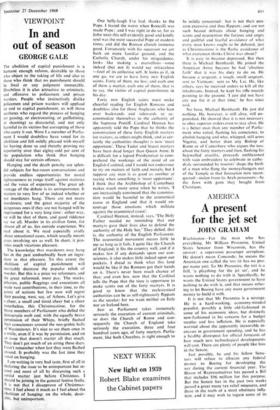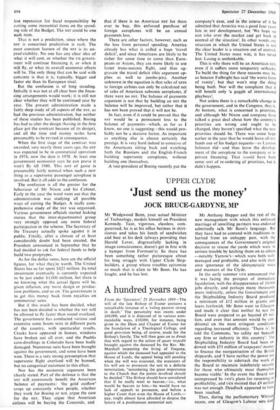AMERICA
A present for the jet set
JOHN GRAHAM
Washinvon—For the man who has everything, Mr William Proxmire, United States Senator from Wisconsin, has the answer: a supersonic passenger aeroplane. He doesn't mean Concorde; he means the American one called the ssr (it has no pro- per name yet). To Mr Proxmire, the SST is a frill, 'a plaything for the jet set', and he wants nothing to do with it. Specifically, he wants the United States government to have nothing to do with it, and that means refus- ing to let Boeing have any more government money to build it with.
It is not that Mr Proxmire is a scrooge. He is a hard-working, economy-minded populist, possibly a little old-fashioned in some of his economic ideas, but distinctly new-fashioned in his concern for a budget surplus and less inflation. He is especially worried about the apparently inexorable in- creases in government spending, and he has a healthy disrespect for oflicial forecasts of how much new technological developments will cost. There are plenty of people like him in the Senate.
Just possibly, he and his -fellow Sena- tors will refuse to allocate any federal money to Boeing for developing the ssr during the current financial year. The House of Representatives has passed a Bill that includes $96 million for this purpose. But the Senate has in the past two weeks passed a great many tax relief measures, and these in the teeth of a most obstinate infla- tion. and it may wish to regain some of its
lost reputation for fiscal responsibility by cutting some inessential items on the spend- ing side of the Budget. The SST could be one such item.
That is not a prediction, since where the ssr is concerned predicition is rash. The most constant feature of the ssr is its un- predrctability. No one has any clear idea of what it will cost, or whether the us govern- ment will continue financing it, or when it will fly, or what its overall economic effects will be. The only thing that can be said with certainty is that it is, typically, bigger and faster etc than its European rival.
But the confusion is of long standing. Initially it was not at all clear how the finan- cing arrangements would work; it is still not clear whether they will be continued year by year. The present administration made a fairly deep study of all aspects of the SST, as had the previous administration, but neither of these studies has been published. Boeing has had to alter the design (having in the first place got the contract because of its design), and all the time and money scales have presumably to be revised in consequence.
When the first stage of the contract was awarded, very nearly three years ago, the SST was expected to be in commercial operation in 1974; now the date is 1978. At least one government economist says he can prove it won't fly till 1980. This sort of game is presumably fairly normal when such a new thing as a supersonic passenger aeroplane is involved. But it all adds to the confusion.
The confusion is all the greater for the behaviour of Mr Nixon and his Cabinet. Early in the year the word went out that the administration was studying all possible ways of cutting the Budget. A really com- prehensive study of the ssr was organised. Various government officials started leaking stories that the inter-departmental group very strongly opposed any more federal partiCipation in the scheme. The Secretary of the Treasury actually spoke against it in public. Finally, after a climate of at least considerable doubt had been created, the President announced in September that he had decided to ask for federal funds to help build two prototypes.
As for the dollar sums, here are the official figures, for what they.,re worth. The United States has so far spent $623 million. Its total investment eventually is currently expected to be just under $1,000 million, but there is no knowing what the actual figure will be, given inflation, any more design or produc- tion problems, and so on. The government is to get this money back from royalties on commercial sales.
But if this much has been decided, what has not been decided is whether the SST will be allowed to fly faster than sound overland. The government has conducted various and extensive sonic boom tests in different parts of the country, with spectacular results. Cracks have appeared in houses, windows have broken out all over, and the Pueblo cave-dwellings in Colorado have been badly damaged. Numerous suits have been brought against the government, and some have been won. There is a very strong presumption that supersonic flight overland will be banned, but no categorical statement to this effect.
Nor has the economic argument been clearly stated. Part of the defence is that the SST will enormously benefit the American balance of payments: 'the gold outflow' crops up constantly when people, whether they work for Boeing or not, argue the case for the SST. They argue that American airlines will be buying the Concorde, and
that if there is no American ssr for them ever to buy, this enforced purchase of foreign aeroplanes will be an annual payments loss.
There are other factors, however, such as the loss from personal spending. America already has what is called a huge 'travel deficit', and since Americans are likely to be richer for some time to come than Euro- peans or Asians, they are more likely to use faster trans-oceanic flight, and thus ag- gravate the travel deficit (this argument ap- plies as well to jumbo-jets). Another unknown in the equation is that sales of ssrs to foreign airlines can only be calculated net of sales of American subsonic aeroplanes, if there were no ssr. The balance of payments argument is not that by building an ssr the balance will be improved, but rather that it has not been proved that it will not be.
In fact, even if it could be proved that the SST would be a permanent loss to the balance of payments—which, as far as I know, no one is suggesting—this would pro- bably not be a decisive factor. As important as anything else is almost certainly the prestige. It is very hard indeed to conceive of the Americans sitting back and watching both the Russians and the English-French building supersonic aeroplanes, without building one themselves.
A vice-president of Boeing recently put the
company's case, and in the course of it he admitted that Amerita was a good four years late in ssr development, but 'We hope we can take over the market and get back in control of the situation'. In other words any situation in which the United States is not the clear leader is a situation out of control. The United States must win; it has never lost. Losing is unthinkable.
This is why there will be an American ssr, even if it suffers more temporary setbacks. To build the thing for these reasons may be, as Senator Fulbright has said 'the worst form of vanity', but that won't stop the thing being built. Nor will the complaint that it will benefit only 'a gaggle of international playboys'.
Not unless there is a remarkable change in the government, and in the Congress, that is. At bottom, what is concerned is priorities, and although Mr Nixon and company have talked a great deal about how the country's priorities are wrong and ought to be changed, they haven't specified what the new priorities should be. There was some hope earlier in the year that he would leave all ssr funds our of his budget requests—as Lyndon Johnson did—and thus leave the develop- ment of the aeroplane to the company or to private financing. That would have been some sort of re-ordering of priorities, but it didn't happen.















































 Previous page
Previous page